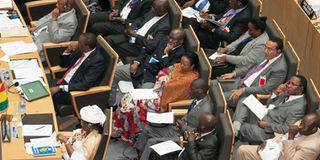Kenya's deferral bid still on despite ICC move, says UN envoy

President Uhuru Kenyatta and part of the Kenyan delegation at the AU extraordinary session follow proceedings at the African Union Centre in Addis Ababa, Ethiopia. The push for deferral of Kenya’s cases at International Criminal Court will go on despite the decision to postpone the start of President Uhuru Kenyatta’s trial
The push for deferral of Kenya’s cases at International Criminal Court will go on despite the decision to postpone the start of President Uhuru Kenyatta’s trial.
(VIDEO: Why the ICC postponed Uhuru trial)
Kenya’s representative to the permanent UN Mission, Macharia Kamau, said the decision had no effect on Kenya’s and the African Union (AU) bid to have the case deferred for one year.
“We have been very clear in what we seek. Our letter asked the court to suspend the proceedings until we get an outcome from the Security Council. The latest move by the court is too little too late,” Mr Kamau told the Nation.
The envoy spoke on a day that saw the United Security Council hold its first interactive meeting at the UN headquarters.
“We had fruitful discussions with all the permanent representatives of the members of the Security Council. But we won’t get any formal feedback until the plenary session is held,” said Mr Kamau.
On Thursday, ICC judges pushed the start of the President Kenyatta’s trial to February 5.
But even as Mr Kamau was calling the postponement inconsequential, some observers saw the move as a potential impediment arguing that it could adversely affect the push by the African Union.
NO URGENCY
“The Security Council may make reference to the ICC ruling and choose to dilly dally. They could say that now there is no urgency in considering the request,” said David Ochwang’i, an Atlanta based political analyst.
The latest development comes in the wake of a spirited diplomatic offensive by the government and the African Union at the UN Security Council to have the cases against President Kenyatta and his deputy William Ruto deferred.
A source familiar with the workings within the United Nations circles in New York told the Nation that following Thursday’s informal meeting, the 15 members of the Security Council could hold a closed-door session anytime beginning next week.
‘‘It all depends on how urgent they think the matter is. These officials deal with a myriad issues and priority is only given depending on whatever else is in their in-tray,” said our source.
“After the closed door meeting is held, Rwanda will formally present the African Union’s petition after which a vote will be taken,” he added.
The Rome Statute that established the International Criminal Court mandates the UN Security Council to refer cases to the court, and, if deemed necessary, to defer an investigation or a prosecution for up to a year.
It also can extend the deferral for another year if it deems it necessary.
The move by the African Union member States to seek deferral as an entity is unprecedented and is watched keenly by various stakeholders.





